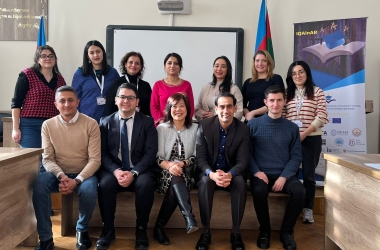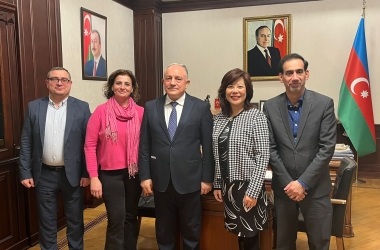Wittenborg Online News!
Wittenborg Visits Azerbaijani Partner Universities to Discuss Quality Assurance
Wittenborg Visits Azerbaijani Partner Universities to Discuss Quality Assurance
Wittenborg Visits Azerbaijani Partner Universities to Discuss Quality Assurance

Maggie Feng and Rauf Abdul Representing the School in Activities Related to IQAinAR Project
To strengthen connections with partner universities that are working to improve their internal quality assurance systems, Wittenborg CEO Maggie Feng and Head of the School of Business, Rauf Abdul, were in Baku, Azerbaijan, from 15 to 19 January.
The activities were conducted as part of the Erasmus+ research project Internal Quality Assurance in Azerbaijan and Russia (IQAinAR), which is funded by the European Union. This initiative, led by Wittenborg, includes three Azerbaijani partner higher education institutions: Azerbaijan State Pedagogical University, Nakhchivan State University and Azerbaijan Technical University.
Additionally, it involves 456 International BV from the Netherlands, Fundación Universitaria San Antonio from Spain and the Education Quality Assurance Agency of the Republic of Azerbaijan.
During the visit, Feng and Abdul attended research meetings at Azerbaijan State Pedagogical University, which hosted an event for all local and international partners from Spain and the Netherlands. The Wittenborg representatives also had a tour of Azerbaijan Technical University, where they met with the university rector Vilayat Valiyev and senior management staff.
Wittenborg CEO Maggie Feng highlighted that Azerbaijani universities have recently started implementing quality assurance systems and that the country is going through a culture change in this sense.
“These are new practices in Azerbaijan, and students need some time to get used to voicing their opinion regarding the quality of teaching, lecturers, modules, curriculum and the university services in general. The students need to feel that they are empowered, and for that to happen, the system also needs to undergo a culture change. This is a long-term process, and we are really happy to see that Azerbaijan, its Ministry of Education and its universities understand the importance of these changes. They’re determined to make internal quality assurance a part of their culture.”

Feng added that this was her first trip to Azerbaijan, and Baku struck her as a city which blends tradition and modernity.
“Baku is an amazing city, with a rich history; it has a charming old centre, new skyscrapers, a lovely promenade and beaches. Visiting Azerbaijan, I also had the opportunity to learn more about other countries in Central Asia, such as Uzbekistan, Georgia, Turkmenistan and others. The people in Azerbaijan are very different from the Dutch, and they’re much more serious and formal during work meetings, which was a bit of a culture shock. On the other hand, you understand that they want to be taken seriously and they do work hard. The country has great potential, as well as the entire region.”
Head of the School of Business Rauf Abdul said that the visit was very productive and provided important updates on the IQAinAR project, which is set to be completed by January 2025. “In mid-April, all IQAinAR research partners will be visiting Wittenborg to share their continuous progress and discuss the completion of all the deliverables of the project,” he pointed out.
Abdul commented that, just like Feng, this was his first visit to Azerbaijan. “It is a very progressive small country with good ambitions. People are keen on providing top-quality higher education, which is vital for both the youth and the economy of any country,” he said.
WUP 19/02/2024
by Ulisses Sawczuk
565 words